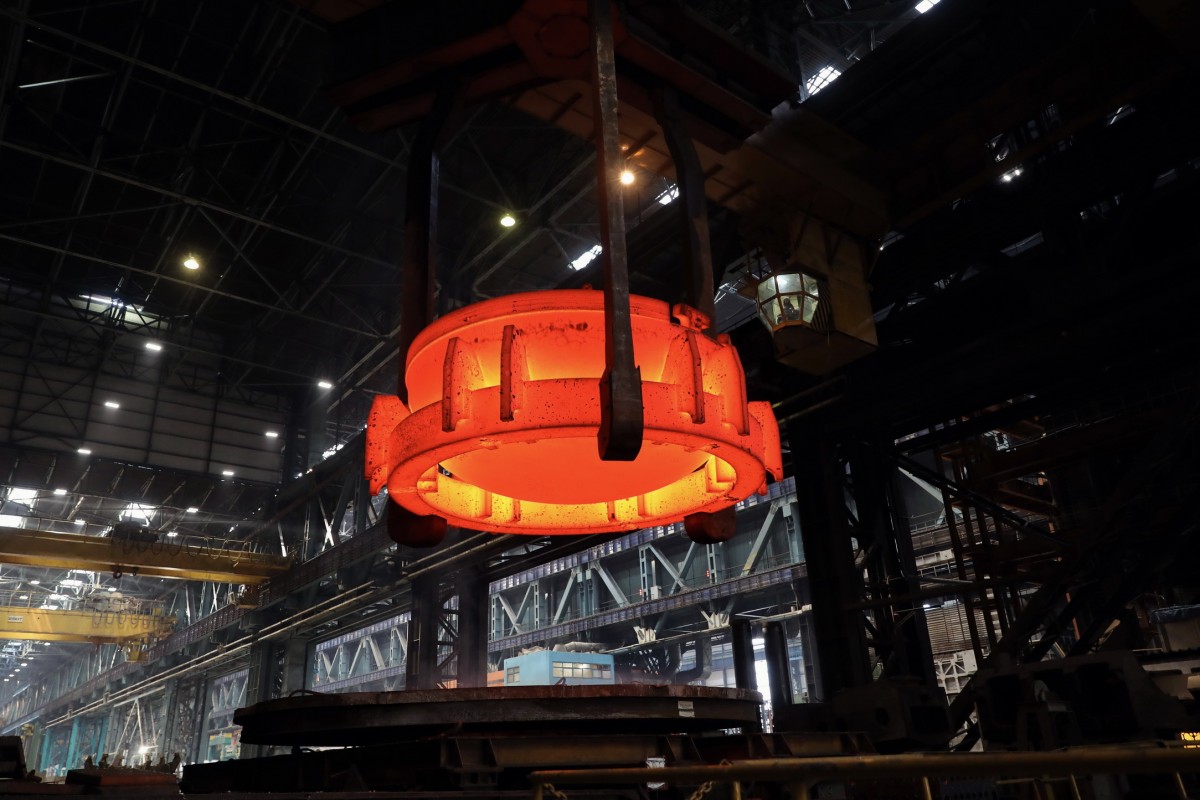 Specialists of the Volgodonsk branch of AEM-technology – Atommash (part of the engineering division of Rosatom) have been hardened by the bottoms of the nuclear reactor being manufactured for unit 4 of the Akkuyu NPP under construction in Turkey. Manufacture of the bottom consists of four main operations: pipe cutting, pipe bending into the sheet, stamping of the hot workpiece in the hemisphere and hardening.
Specialists of the Volgodonsk branch of AEM-technology – Atommash (part of the engineering division of Rosatom) have been hardened by the bottoms of the nuclear reactor being manufactured for unit 4 of the Akkuyu NPP under construction in Turkey. Manufacture of the bottom consists of four main operations: pipe cutting, pipe bending into the sheet, stamping of the hot workpiece in the hemisphere and hardening.
At the final stage, the product was heated in an underground furnace at a maximum temperature of 910° C for nine hours. It was then placed in a caisson with water foran hour and a half. To obtain the required mechanical properties of the metal, the product was moved to the heat-start furnace, which was held at a temperature of 650° C for about 25 hours.
Akkuyu is the first nuclear power plant under construction in Turkey and will eventually host four units of Russian-designed VVER-1200 reactors. The pouring of first concrete for unit 1 took place in April 2018, for unit 2 in June 2020, for unit 3 in March 2021, and for unit 4 in July 2022.
Rosatom First Deputy Director Kirill Komarov told Atomexpo 2022 that Russia was solely responsible for project financing, which he said is fully funded for the next few years.The funding comes from Rosatom’s own funds and loans from Russian banks. Last year alone, said Komarov, Rosatom for the first time acquired more than $800 million in green financing from banks, along with regular loans not linked to green commitments.
“So, today, the situation with the project is absolutely stable. I can say that the sanctions had no effect on it. Today, nothing in the nuclear energy sector in the world is under any sanctions,” he emphasised. He said Akkuyu was currently the largest NPP construction site in the world, with a capacity of almost 5GWe and the only site in the world where four reactors are being built at the same time. “This is truly a unique situation, and we are proud of it. Work at the construction site is going very well,” he added. Once completed, the plant is expected to produce up to 10% of domestic electricity needs. It will have an estimated service life of 60 years with the possibility to extend it for another 20 years and is expected to employ around 4,000 people during its operation.
Rosatom holds a 99.2% stake in the Akkuyu plant that is estimated to cost around $20 billion, marking the biggest investment in Turkey's history implemented at a single site. Komarov refuted claims that the plant would generate power at high prices, which when the agreement was signed in 2010 between Russia and Turkey were expected to be around $0.12 per kWh. According to Komarov, the current generation price range is between $0.18 and $0.20 per kWh, a level that is much higher than $0.12 per kWh, which will prevail regardless of the cost of uranium in the world or the cost of other energy sources. “The electricity produced by the plant will cost Turkey $0.12, a stable and predictable price. This is a huge advantage for Turkey,” he said.
Negotiations on what would be Turkey's second NPP have started, Deputy Energy and Natural Resources Minister Alparslan Bayraktar told Atomexpo 2022. The plant is planned to be built in the northern province of Sinop. “We need at least 16 to 20 reactors, according to our initial estimates, or we need 12 to 16 reactors in addition to the Akkuyu NPP to be a carbon-neutral economy by the turn of the century.” Bayraktar also disclosed that Turkey is in talks with South Korean and US companies for nuclear energy development, while negotiations are ongoing with the Chinese government for a third power plant.
Image: The bottom of the nuclear reactor for unit 4 of Akkuyu nuclear power plant (courtesy of Rosatom)



